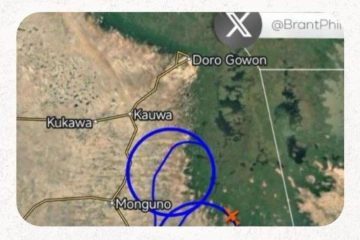“We’ve Got Enough Problems!” — Nigeria Rejects U.S. Push to Accept Venezuelan Deportees

By iNewsAfrica Staff Writer | July 11, 2025

BRASÍLIA, BRAZIL – In a striking rebuke to the United States, Nigeria’s Minister of Foreign Affairs, Yusuf Tuggar, has declared that the West African nation will not accept Venezuelan deportees under any immigration deal with Washington, citing Nigeria’s own pressing domestic challenges.
Speaking on the sidelines of the BRICS summit in Brazil, Tuggar dismissed the proposal as both “unreasonable” and “unacceptable,” emphasizing, “We have enough problems of our own … we cannot accept Venezuelan deportees in Nigeria, for crying out loud.”
The minister’s remarks come amid reports that the U.S. government is lobbying several African countries—including Nigeria, Senegal, Guinea-Bissau, Liberia, Mauritania, and Gabon—to receive migrants and ex-convicts deported from the U.S., particularly those who cannot be repatriated directly to their home countries.
Tuggar, known for his forthright diplomacy, punctuated his refusal with a cultural flourish—quoting American rapper Flavor Flav’s line: “Flavour Flav has problems of his own. I can’t do nuttin’ for ya man.” The quote sparked laughter but underscored a serious message: Nigeria is not a dumping ground for the world’s migrant crises.
“We are a sovereign nation of over 230 million people. We are dealing with unemployment, insecurity, and post-COVID economic recovery. Taking in deportees from halfway around the world is simply not on the table,” Tuggar asserted.
The minister further clarified that Nigeria remains open to fair partnerships with the U.S. on economic cooperation, gas exports, and critical-mineral trade—but not at the cost of its dignity or stability.
The controversy reflects broader tensions between African nations and Western powers over immigration policies, particularly as the Trump administration doubles down on its third-country deportation strategy. Legal experts say the move may face scrutiny under international human rights law if coercive diplomatic pressure is confirmed.
While the U.S. has yet to publicly comment on Tuggar’s statement, reactions across Africa suggest that many leaders share Nigeria’s sentiments. The coming weeks will test how far Washington is willing to push—and how firmly African nations will hold the line.
For more updates on U.S.–Africa relations and global migration diplomacy, follow iNewsAfrica.
NAF Confirms Alpha Jet Crash in Niger State, Pilots Eject Safely
December 6, 2025
Leave a reply Cancel reply
Popular Categories
- Colombia 1
- Nepal 1
- Culture 1
- Trade 1
- Ivory Coast 1
- ICJ 1
- Somali 1
- Europe 1
- United Nations 1
- Israel 1
- Travel 1
- Thailand 1
- Brazil 1
- Finland 1
- West Africa 1
- Automobile 1
- Mauritania 1
- Entertainment 1
- Mozambique 1
- Morocco 1
- Zimbabwe 1
- Myanmar 1
- Space 1
- The Hague 1
- Tunisia 1
- Vatican City 1
- Book & Arts Spotlight 1
- UNDP 1
- ECCAS 1
- Vietnam 1
- senegal 1
- Terrorism 1
- Global Diplomacy 1
- Wildlife 1
- Weather 1
- Celebration 1
- Interview 1
- BRICS 1
- Gambia 1
- Defense 1
- Gabon 1
- Pakistan 1
- Togo 1
- Democracy 2
- World Bank 2
- Algeria 2
- Rome 2
- Energy 2
- New York City 2
- Science 2
- Zambia 2
- Church 2
- Angola 2
- Economy 2
- Somalia 2
- Guinea 2
- Middle East 2
- Benin Republic 2
- Cameroon 2
- London 2
- Education 2
- Sierra Leone 2
- Business 2
- Chad 2
- Caribbean 2
- Ukraine 2
- Haiti 2
- Ukraine 2
- India 3
- Russia 3
- Uganda 3
- South Sudan 3
- Crime 3
- Namibia 3
- Music 3
- Ethiopia 3
- Transportation 3
- Rwanda 3
- Guinea-Bissau 3
- Lesotho 3
- France 3
- Aviation 3
- Congo 3
- Liberia 4
- Tanzania 4
- Health 4
- ECOWAS 5
- Libya 5
- Egypt 5
- UN 5
- UK 6
- Mali 7
- China 7
- Niger 8
- Editorial 8
- Sudan 9
- Burkina Faso 10
- Politics 11
- Tech 12
- Technology and Business 13
- Ghana 13
- World 15
- DR Congo 15
- Kenya 17
- Sports 17
- Opinion 18
- People 23
- South Africa 29
- US 47
- OP-ED 64
- Africa 87
- Nigeria 160

Email: [email protected]










